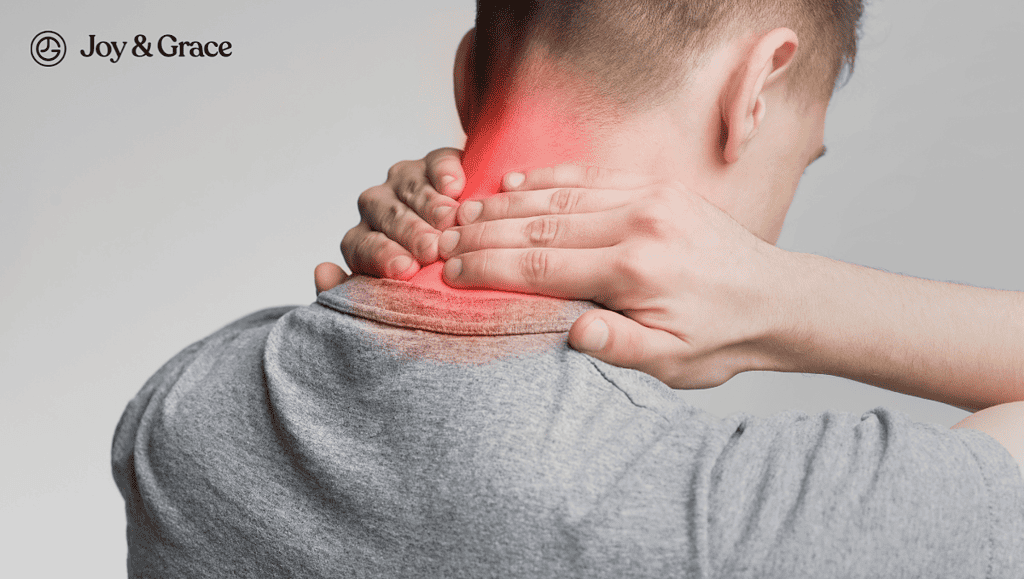Up to 85% of people with neck pain may struggle to find effective treatment. This is often due to not understanding the underlying cause or not exploring available remedies. Neck muscle pain can turn even the simplest tasks into a painful ordeal, ruining your entire day. But worry not, because you're in the right place!
We're diving deep into the world of neck muscle pain. We’ll be exploring the causes, easy at-home remedies, and expert tips that’ll make your discomfort a thing of the past.
What Causes Muscle Pain In The Neck?

Muscle pain in the neck can be due to various triggers and conditions. Neck muscle pain, or cervical myalgia, can be due to the following:
- Neck muscle strains or sprains
Muscle strains or sprains are the most common injuries to the neck.
These injuries happen when your neck muscle or its tendon is stretched past its limit. You might know these injuries as a “pulled muscle.”
Neck strains or sprains usually result from sudden movements or overexertion of your neck. This can happen due to:- Poor posture, like hunching over your phone
- Overuse
- Lifting or carrying heavy objects
- Performing exercises incorrectly
- Accidents
These activities can cause tiny tears in the muscle fibers, leading to symptoms such as:
-
- Localized pain
- Mild swelling
- Limited mobility

- Muscle Tension
Muscle tension, or tightness, is when your neck muscles stay partially contracted or “activated” for an extended period.
When muscles remain tense for prolonged periods, they can become painful and uncomfortable. Muscle tension can be due to the same causes as muscle strains and sprains. It can also be due to chronic stress.
- Depression and Anxiety
It's important to acknowledge that physical pain can often serve as a silent manifestation of deeper struggles like depression and anxiety.
Both conditions have been linked to neck pain, possibly due to abnormal pain perceptions and the overwhelming effects of persistent stress.
This connection can create a never-ending cycle: mood disorders can cause physical pain, and the pain can worsen your mood disorder.

- Dehydration
Dehydration can also lead to muscle pain due to electrolyte imbalances. Electrolytes are essential for muscle function and regulate muscle relaxation and activation. When you exercise or engage in physical activity, you lose electrolytes through sweat. This imbalance can lead to muscle cramps and pain.
- Fibromyalgia
Fibromyalgia is a chronic condition characterized by widespread pain and tenderness in the muscles. It also comes with extreme fatigue.
Though the exact cause is unknown, it is associated with abnormal pain processing in the central nervous system.
People with fibromyalgia commonly suffer from deep, aching pain in various body parts, including the neck.
- Myofascial pain syndrome
Myofascial pain syndrome is a chronic pain disorder characterized by trigger points.
These are sensitive areas in muscles or connective tissue that can develop due to overuse, injury, or stress. These trigger points can occur anywhere in your body, including your neck.
While these causes may seem daunting, there are many interventions you can take to get rid of neck muscle pain. We'll delve into these solutions shortly.
What Causes Severe Neck Muscle Pain?
All the conditions we mentioned earlier can cause severe neck muscle pain in some cases.
For example, muscle tension can lead to neck spasms or cramps, which can be extremely painful.
The pain from muscle strains can also depend on the severity of the injury. In general, muscle strains are classified into:
- Grade 1: Mild strain with minimal damage to muscle fibers. It may cause some discomfort but usually doesn't stop you from enjoying any activity.
- Grade 2: Moderate strain with partial tearing of muscle fibers. This results in noticeable pain, swelling, and limited movement. You might have some trouble performing certain activities.
- Grade 3: Severe strain, where the muscle is completely torn or ruptured. This can cause severe pain, swelling, and loss of function. Grade 3 strains often require medical attention and can take a long time to heal.
Be sure to be upfront with your healthcare provider regarding the severity of your pain. This can dictate what treatments you receive to get rid of the pain.
How Do I Relieve Neck Muscle Pain?
So, how can you get rid of neck muscle pain if there are so many possible causes? Well, the good news is that most of the treatments work for all the common causes of neck muscle pain.
Here are some tips that may help relieve mild to moderate neck muscle pain:
- Rest
It’s important that you take a break from any strenuous activity and allow your neck to rest and recover.
- Proper Posture
Maintaining correct posture not only helps relieve sore neck muscles but also prevents them. If you spend your entire day hunching over your computer, adjust your workstation to make it more ergonomic.
- Get restful sleep
A good night’s sleep can help your neck muscles recover. Make sure you keep a regular sleep schedule and make your bedroom conducive to sleeping. Make sure to not sleep on your stomach, as this can cause muscle tension. Also, having a supportive pillow and mattress that can keep your cervical spine aligned makes a huge difference.
- Ice
Applying ice to your injured muscles can help reduce inflammation. It constricts blood vessels, limiting blood flow to the injured area and thereby reducing swelling and pain.
The cold from the ice can also temporarily numb the pain. Use a cloth or towel to wrap the ice pack to avoid direct skin contact. Apply the ice for 15-20 minutes every 2-3 hours during the initial 48 hours after the injury.
- Heat
If ice limits blood flow, heat increases blood flow to the injured muscle, promoting healing. Heat can also help relax tense neck muscles. You can use a hot water bottle, a warm towel, or a heating pad. Apply the heat for 15-20 minutes at a time. Make sure it's warm, not hot, to avoid burns. Heat can be applied after the initial 48 hours of injury. However, if there's still swelling present, avoid using heat even after this period.

- Get proper hydration and have a balanced diet
It's essential to stay hydrated and consume a balanced diet that includes foods rich in electrolytes, especially if you're physically active. Sports drinks can also help replenish lost electrolytes during intense physical activities.
- Neck exercises
Regular neck exercises can help make your neck muscles stronger. Neck stretches can also help loosen any tight muscles causing your pain. Like proper posture, exercise and gentle stretches can relieve pain and help prevent it from returning. We have a great list of simple neck stretches and exercises here.
- Over-the-counter painkillers
Over-the-counter pain relievers, like ibuprofen, can also be helpful. However, they should not be your go-to solution. Before using these, ensure you follow the directions on the package.
By adding these tips to your daily routine, you can get rid of pain from a pulled neck muscle or muscle cramps.
Note: If your pain is from something like fibromyalgia or a severe muscle strain, you might need a more comprehensive treatment plan. This requires a proper evaluation from a healthcare professional.
How Do I Treat Severe Neck Muscle Pain?

If your pain persists or worsens, visit a healthcare professional. Before proceeding to other forms of treatment for neck pain, you should get a proper evaluation and diagnosis.
With that in mind, your doctor may suggest the following methods to manage severe or persistent neck muscle pain:
- Physical Therapy
Physical therapy is a comprehensive approach to treating severe neck muscle pain. Physical therapists or other duly trained medical professionals can create a rehabilitation program tailored to your condition. Additionally, they can guide you on activity adjustments that help prevent further injury.
- Massage therapy
Professional massage therapists can use various techniques to relax tense muscles and reduce neck stiffness. A massage can also enhance blood flow to the injured muscles, aiding healing. Another great reason to get a massage is for some stress relief. Not only does this help you get some weight off your shoulders, but it also helps loosen up a tight neck.
- Medication
Apart from over-the-counter painkillers, your doctor might give you a prescription for stronger medicines. For instance, they may prescribe a muscle relaxant to help relieve pain from a neck cramp. Muscle relaxants decrease the signals responsible for muscle contraction, making them effective against neck spasms. However, these drugs should not be used for more than two weeks, as they have adverse side effects.
Your doctor may also recommend corticosteroid or anesthetic injections.
- Manual Therapy
Physical therapists and chiropractors use manual therapy to treat musculoskeletal pain and dysfunction. It's a hands-on approach that can include massage, manipulation, and mobilization, among other things.
According to a study, manual therapy, along with stretching, was effective in temporarily reducing spontaneous and strain-induced pain in people suffering from chronic neck pain.
Does Neck Muscle Pain Go Away?

All kinds of pains, even small ones, can stick around if we don't take care of them. That said, neck pain usually does indeed get better, but how fast it goes away really depends on what caused it in the first place.
For instance, neck pain from a muscle strain or sprain and muscle tension usually improve over time.
If your pain is from fibromyalgia, however, you might experience periods of relief called remission. However, fibromyalgia is a chronic medical condition, so you might have to deal with “flare-ups” for the rest of your life.
Meanwhile, myofascial pain can either be acute or chronic. Acute myofascial neck pain can go away on its own or quickly resolve after treatment. However, chronic myofascial pain can last six weeks or longer. Like fibromyalgia, you may have to deal with flare-ups your entire life.
The bottom line is that taking the right steps to address your neck pain can greatly boost the likelihood of a quicker recovery. Remember, the duration of the pain often hinges on its root cause, so understanding and treating it properly is key.
How Long Does It Take for Neck Muscle Pain to Go Away?
It usually depends on the severity of the injury. Pain from muscle tension usually resolves within days. Most cases of neck sprains or strains take up to 4–6 weeks to completely heal. Severe cases can last longer.
Remember, if your neck pain persists or intensifies despite home remedies, it’s time to see a doctor.
Is Neck Muscle Pain Serious?
Neck muscle pain can range from mild annoyance to debilitating issues impacting your daily life.
Again, while most cases of neck muscle pain are not worrisome, the seriousness depends on the cause and severity.
A simple strain or overexertion of the neck muscles can lead to temporary pain that gradually fades away with basic care. This is usually nothing to worry about.
However, when the pain is constant, extreme, or doesn't improve with self-care measures, it may indicate a more serious issue. Furthermore, it’s very important to seek medical attention immediately if your pain appears right after a serious accident or trauma.
Other symptoms to watch out for include:
- Headaches
- Weakness
- Numbness
- Tingling
- Fever
Takeaway
Neck muscle pain can disrupt your daily activities, but achieving relief is within reach. The key to this is understanding the underlying causes of your pain, which can include:
- Muscle injury
- Muscle tension
- Depression and anxiety
- Fibromyalgia
- Myofascial pain syndrome
Understanding the root cause of your neck pain and exploring appropriate remedies can enhance your path to relief.
Some commonly recommended methods include:
- Rest
- Exercise
- Heat and ice therapy
- Maintaining proper posture
- OTC painkillers
However, always pay close attention to your body. If the pain is severe or persistent, seek medical attention, as it might indicate a need for more specialized treatment.















